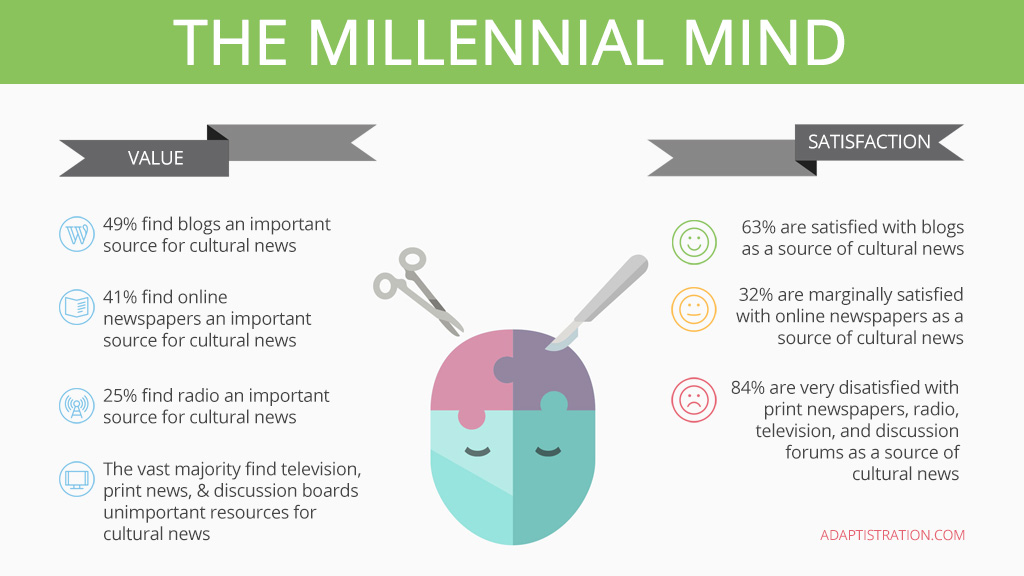Since this is the 100th entry for the Adaptistration web log, I thought it would be fitting to post a reader email. I recently received this note from a reader who wishes to anonymously share a recent experience and to address some of the issues from my articles:
I’ve just discovered your blog for the first time this morning, and I’m enjoying it immensely. In January, I completed the American Symphony Orchestra League’s “Essentials in Orchestra Management” seminar, which in ten days covered all the bases of running a modern orchestra: marketing, finance, development, education, labor management, etc. Four of the “Big Five” orchestras sent their executive directors, and clearly the League put a lot of stake in it.
As you can imagine, the deficit crises currently facing orchestras was downplayed, with people like Jack McAuliffe insisting that “Audiences have always been old” and that music will survive, because it always has. Those of us who suggested that there might be a better way to do things were basically told that we didn’t appreciate the challenges facing today’s [orchestra] executive directors.
On the last day, we were each given half-an-hour with an executive director. I sat down with an executive from one of the big orchestras and asked that person point blank whether or not music was in a state of crisis. “Yes, there is a crisis,” they admitted. “And we take it seriously.” The executive then went on to echo another senior industry executive’s belief that orchestras shouldn’t necessarily be expected to balance their budgets, even with contributed income. We even had Bill Thomas, Chief Financial Officer of the New York Philharmonic, tell us that he was “perfectly OK” knowing that his balance sheet would never add up.
Coming from the for-profit world, a lot of this obviously rang hollow with me, with the result being that I have had serious second thoughts about pursuing a career in orchestra management, at least within one of these establishment orchestras. Instead, I’ve decided to set my sights a bit smaller project: working with individual musicians to mix chamber music with rock in traditional indie [independent] rock venues an outgrowth of the current trend of bands using strings and other “classical” instruments as part of their setup. But, as you and I both know, there’s nothing that can match the power and presence of a full symphony orchestra, and I’d love to find a way to help bring that music to people while hopefully being fiscally responsible.
To be fair, if I learned anything from this seminar, it’s that there are a lot of challenges facing today’s executive directors. But most of them are stupid challenges: like negotiating riders with soloists and their own musicians, which place heavy restrictions on their hours, and have travel requirements resembling those of rock stars. Or kissing rich people’s asses to help pay for all this nonsense which then alienates anyone who might be truly interested in the music.
Also, I have to take exception to your vicious grilling of Joe Kluger and his recent raise in the face of the Philadelphia Orchestra’s budget cuts. My impression is that he’s much more interested in overhauling the current system than keeping things old school. Sure, the raise doesn’t look good, but let’s face it: Joe’s salary isn’t going to break the bank next to the $1.7 million they’re paying Eschenbach, or the $75-100k they pay Rattle per concert. Don’t throw the baby out with the bathwater.
The reader has a number of very observant points, each worthy of its own blog entry, while simultaneously painting a clear picture of the group-think mentality that permeates this industry. Regarding the Joe’s gotta’ go grilling; I covered that in yesterday’s blog, so I’ll save me the time re-typing and you the time re-reading.
But let’s start with the statement from one of the League’s executives that classical music will survive because it always has? I won’t even go into how many logical fallacies a statement like that commits, but it seems that there’s much less motivation to change the way you do business if you think it’s all going to work itself out in the end anyway. And I’ve heard the same old tired argument that people don’t “appreciate the challenges facing today’s executive directors” more than I care. I see it as a convenient excuse that many in the industry use to justify their lack of accessibility.
For example, take the focus of the reader’s letter; the American Symphony Orchestra League. They collect detailed annual information and statistics about their member orchestra’s operations. But this information is only available to senior executives of each member orchestra and can’t be distributed to any outside entity without the permission of the League’s executive board. You can probably guess how often that happens. Why is there such a cloud of mystery surrounding the organizational information of non-profit orchestras?
I do believe that the executive leader’s of today’s orchestras honestly think that the way things are done is the best way to do them. And after all, no executive is all bad; they each have to have at least one good leadership quality. But they also know that the vast majority of people outside looking in would scratch their head after hearing a statement like “we are perfectly OK knowing our balance sheet would never add up” coming from an orchestra’s executive manager. But it’s not because people don’t “appreciate the challenges facing today’s executive directors” so much as it’s because the executives don’t want to have to face the facts that the way business has been done perhaps isn’t the best way to do it.
Of course there are challenges facing all of today’s orchestras, but instead of evolving to and adapting, the industry is still trying to sledge hammer that square peg into a round hole. Instead of changing themselves to fit a brave new world, they are arrogantly insisting that the world change to suit their 19th century model. Just because classical music as we know it has always survived is not a reason that it always will. Will it die in my lifetime? Doubtful, but I would prefer to not have history look back at our moment in time and say “this is where they failed to take action, this was the beginning of the end”.
These are all great topics for discussion and you can count on the fact that we’ll get to each and every one over the coming months. What are your opinions? What have you noticed as someone on the outside looking in? And what about those of you on the inside looking in, what are your thoughts about all of this? Send in an email and let us all know. In the end we can all learn quite a bit and it won’t even cost you the $1,945.00 tuition and application fee (plus League membership dues) that you would have been charged to attend the “Essentials in Orchestra Management” last January. Such a deal!


